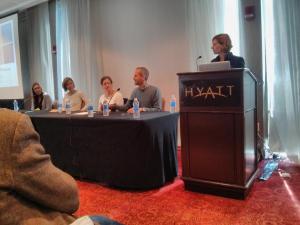By Emily Conover
From starting your own podcast to self-publishing an e-book, sometimes a science writer just feels the need to go it alone. Although it can be a challenge to make such ventures turn a profit, they can be worthwhile, said panelists during a session titled "DIY publishing — Does it yield?" held during the Science Writers 2015 Conference in Cambridge, Mass.Alex Blumberg left his public radio job to start his company, Gimlet Media, a podcast network focused on narrative journalism and storytelling. Blumberg, ever the storyteller, documented the start-up process in a podcast. When raising money to get his company off the ground, he used that podcast as a prototype to convince investors to fund him. The lesson learned: "You need the money to get started but you also need to start doing the thing to get the money," Blumberg said. Another tip — find a partner who is a strong in business. "If you're a good journalist you are almost by default not good at business."
Getting off the ground is only the first step in the process. You also have to find an audience, said Cynthia Graber, a co-founder of Gastropod, a podcast about the science and history of food. Since they launched in September 2014, Graber and her co-host, Nicola Twille, have amassed tens of thousands of listeners. To find their audience, the pair contacted writers who covered similar topics, promoted their show on Twitter and Facebook, reached out to personal connections, and wrote short articles for other outlets to syndicate with embedded audio. "We threw just lots of pieces of spaghetti at the wall and we figured out which were sticking," Graber said.
Although DIY ventures might not be as profitable as other work, they can provide additional rewards that are less tangible. They may advance writers' careers, or help them build new skills, or the projects may be long-term efforts that will produce money in the long run. "We all feel a sense of accomplishment," said Virginia Gewin, co-founder of Bracing for Impact, a climate change reporting project made up of six freelancers and hosted on Beacon Reader, a website that promotes crowd-sourced journalism. The panel's moderator, Hannah Hoag, is also a co-founder of the project, which investigates how people are beginning to adapt to the impacts of climate change that are taking place on the ground now. "We gained a lot, and it was not in a monetary form," Gewin said.
Banding together with other writers can increase the chances of success in self-publishing, says Mara Hvistendahl, a founding member of Deca, a group of long-form writers who publish their stories collectively as e-books. The writers' cooperative publishes their work on an app and on Amazon, as well as through partnerships with publications around the world. And beyond that, they serve as a supportive community for one other. "I'm the child of hippies and this idea of kind of sticking it to the man, and doing it ourselves, and socialism, I thought 'well, sign me up, I'm there,'" said Hvistendahl.

